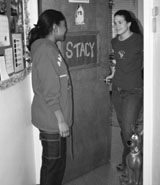Story by Kristina Iodice Somehow, every semester 78 students manage to balance academic responsibilities, a personal life and, most importantly, the welfare of 40 to 50 students in residence halls.
They are resident assistants, and they help to make the residence halls a fun and safe home for students. "RAs are the connection between students and the university," said Brian Coughlin, a junior studio arts major and RA in Clark Hall. "The university wants to help students, so RAs are there not just to administer policy. We play so many different roles, from being a counselor and being a friend to being a policeman." If a student is struggling with a problem, administrators will contact the hall director who will, in turn, ask the RA about the student. RAs have to know about their residents, and they need to recognize who's having a difficult time adjusting and who's not, said Kristin Price, a sophomore speech communications major and Sherley Hall RA. The selection process takes place early in the spring semester for the following fall. Once selected, RAs are required to go through additional training before classes start and attend monthly in-service training sessions. RAs have several orientation presentations and speakers on policy, safety and other services on campus, such as the Health Center and the library, Coughlin said. The training is part of the job, and despite popular belief, the RA position is a never-ending challenge, said Stacy Stuart, a junior radio-TV-film major and an RA in Jarvis Hall.
It is a job that demands sacrifice, but Stuart said it is worth the cost. Stuart said RAs often work during weekends in the office and handle any problems that might occur. An RA on duty can get woken up at any time to take care of a wandering boy in a female dorm or more serious problems like a broken ankle or alcohol poisoning. "There is so much responsibility," she said. "You have to keep yourself on track and focused." The most challenging aspect of an RA's life is balancing relationships with students in his or her wing, Stuart said. "You have to draw the line between treating students as friends and treating them as residents," she said. "But the main thing is to be there for them." Coughlin said RAs are often selected to fit particular halls. He said some halls require more discipline and enforcing policies, so hall directors seek out RAs that best fit the hall's need. Coughlin said RAs also try to plan events to increase resident interaction. "Wing socials are for our residents to interact and bond with each other in a fun way," said Heather Ferra, a junior social work major and RA in Sherley Hall. "We try to meet the needs of our residents while giving them a chance to relax and take a break from the stress of school." RAs must also be able to deal with confrontation, since it's the RA's responsibility to resolve conflict in the residence halls, Coughlin said. He said it's a position where authority is crucial, but once the RA knows the students on his or her wing, they are going to respect him or her. Esther Anderson, a sophomore social work major and Sherley Hall RA said the job requires her to step out of her comfort zone. "It means getting used to the fact that people don't like me and learning to determine what problems are big and what problems aren't so big," she said. Price said being an RA is one of the best jobs on campus and worth the hours of training and planning. "Once you get into the role and situation, you don't think of it as a job," she said. "It's the way you live your life because you're never really not working."
Kristina K. Iodice
By Jeff Anderson staff reporter With a written application, an interview, a group process and a creative presentation, the resident assistant selection process gives students several chances to demonstrate their strengths, housing officials said. The RA application deadline was Monday, and applicants are now preparing for the interview phase of the selection process. Interviews will be held Saturday. Chad McBride, chairman of RA selection and hall director in Clark Hall, said applicants are interviewed by a hall director, two current RAs and a resident. After the interview, groups of 10 to 15 applicants are given a conflict to solve, he said. The students work together in the group process to figure out the best way to solve the specific problem. "It lets them show (hall directors) their strengths," McBride said. The field of applicants is further narrowed after the group activity. The second round consists of an individual two- to four-minute creative presentation covering a wide variety of topics, McBride said.
Dottie Cruz, hall director in Wiggins Hall, said the group process gives hall directors a chance to see how the applicants interact with others in a team situation. "People's personalities come out," Cruz said. Melanie Benning, a junior political science major and RA in Brachman Hall, said different leaders emerge during the group process. McBride said the hall directors and Russell Elleven, associate director of residence life, make the final selection for the RA positions. The RAs will be selected by Spring Break, McBride said. McBride said the applicants who are selected attend a two-week training session in early August where they learn communication skills, counseling skills and basic procedure for emergencies. RAs also learn grief counseling, awareness, and how to handle roommate conflicts, he said. "It's really extensive training," McBride said. "It's solid for two weeks straight." Cruz said the training allows RAs to be exposed to different departments on campus. The training provides all the specifics related to the job, she said. Last year, about 100 students applied for RA positions, McBride said. Applicants must have a 2.6 GPA when hired and have at least a sophomore standing. The competition is strong because around 30 people are hired out of the approximate 100 applicants, McBride said.
Jeff Anderson |
| The TCU Daily Skiff © 1998, 1999 Credits |
 They arrive two weeks before classes start to check residence
hall rooms and move furniture. No matter what day or time it is, they're
on call.
They arrive two weeks before classes start to check residence
hall rooms and move furniture. No matter what day or time it is, they're
on call.  "It's a 24-hour job because anything could happen at
any time," she said. "You just have to be ready when someone
comes to you with a personal problem or someone is looking for a friend."
"It's a 24-hour job because anything could happen at
any time," she said. "You just have to be ready when someone
comes to you with a personal problem or someone is looking for a friend." "It's kind of a lengthy process, but we try to give
(applicants) several chances to show us their strengths," McBride
said. "If you have a bad interview, you still have a chance."
"It's kind of a lengthy process, but we try to give
(applicants) several chances to show us their strengths," McBride
said. "If you have a bad interview, you still have a chance."